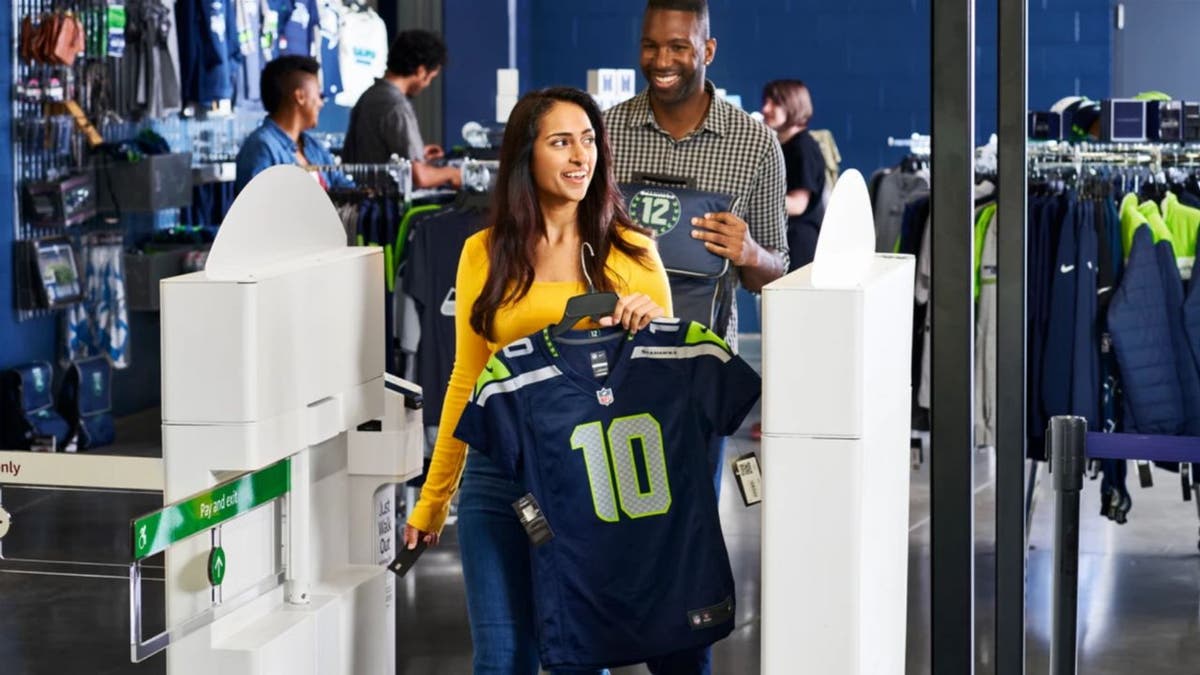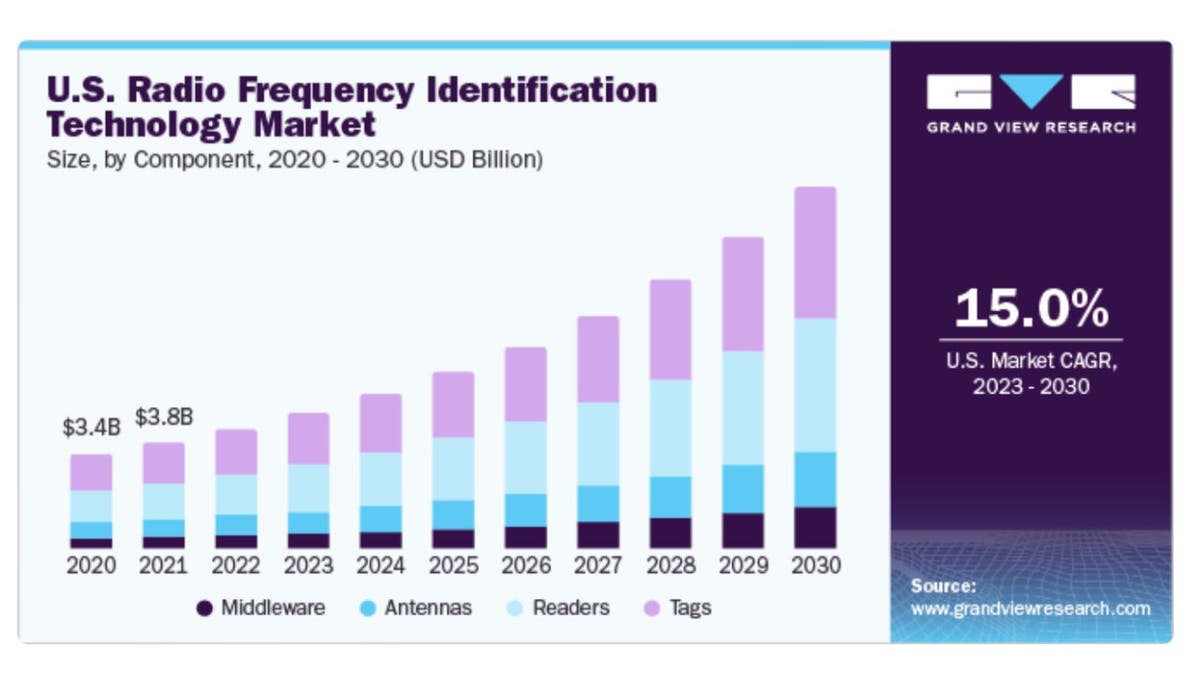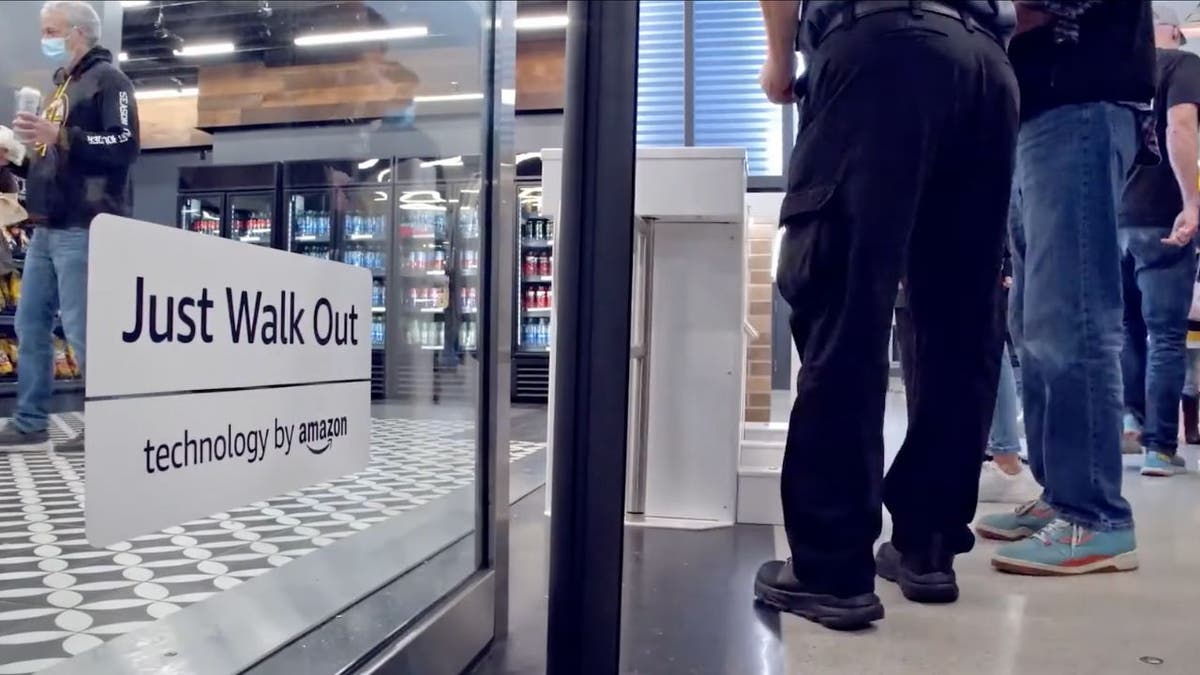Best transmitter to hook up to TV that will connect to Bluetooth earbuds or headphones
Kurt "CyberGuy" Knutsson talks about the best transmitter to use for your TV for Bluetooth earbuds or headphones.
Have you ever wished self-checkout was easier than the glitchy scanning of barcodes?
A new checkout process using old technology is rolling out to happy shoppers.
What is RFID?
RFID stands for "radio frequency identification," a technology that uses radio waves to identify and track objects.
RFID tags are small electronic devices that can be attached to products, and RFID readers are devices that can scan the tags and communicate with them.

Just Walk Out technology also uses RFID for quick checkout. (Amazon)
RFID tags can store information such as the product name, price, expiration date, and origin. RFID readers can read this information from a distance, without requiring direct contact or line of sight.
'CRUNCH TIME' AS CHRISTMAS NEARS RECORD PACKAGE SHIPMENTS THREATEN ON TIME DELIVERIES
How RFID is revolutionizing the retail industry
According to a report by Grand View Research, the global RFID market size was estimated at "USD 15,769.8 million in 2022 and is expected to grow at a compound annual growth rate (CAGR) of 15.1% from 2023 to 2030."
The retail sector is one of the major drivers of this growth, as more retailers are adopting RFID to improve inventory management, customer experience, and operational efficiency.

RFID market chart (Grand View Research)
How does RFID-powered self-checkout work?
RFID-powered self-checkout is a system that allows you to pay for your purchases without going through a cashier or a traditional barcode scanner. At one innovative retailer, Uniqlo, you can simply place your items in a bin, click start on the screen and within 30 seconds, you’re walking out the door with your purchase.
Amazon hopes to expand another RFID checkout experience that has consumers eliminating the point of sale process entirely. The goal is for you the customer to enter a store, get what you need, and walk out the door with your credit card automatically being charged.
GET FOX BUSINESS ON THE GO BY CLICKING HERE
Some of the benefits of RFID-powered self-checkout
Convenience: You can save time and avoid long lines by checking out yourself. You can also enjoy a more personalized and seamless shopping experience, as you can browse and buy products at your own pace and preference.
Accuracy: RFID tags can store more information than barcodes, and can be read more reliably and faster. This reduces the chances of errors, such as scanning the wrong product, missing an item, or charging the wrong price.
Security: RFID tags can prevent shoplifting and fraud, as they can be detected and deactivated by RFID readers. They can also alert the staff if an item is removed from the store without being paid for, or if a tag is tampered with or damaged.
Sustainability: RFID tags can reduce the use of paper and plastic, as they can eliminate the need for printed receipts, labels, and packaging. They can also help reduce food waste, as they can monitor the freshness and quality of perishable products.
MORE: EXPOSING THE TOP SCAMS TARGETING COSTCO SHOPPERS
What are some stores using or testing RFID-powered self-checkout?
Amazon Go convenience stores are using RFID, computer vision, and artificial intelligence to enable a "just walk out" shopping experience. Customers can enter the store, take the items they want, and leave without having to check out or pay at a counter. The items are automatically detected and charged to the customer’s Amazon account.

Just Walk Out technology (Amazon)
MORE: 5 SECRETS TO SHOPPING SMARTER ON AMAZON
Zara, the fashion retailer, has implemented RFID tags in its clothing items to improve its inventory management and customer service. Customers can use self-checkout kiosks that scan the RFID tags and accept various payment methods. The kiosks also provide suggestions for complementary products and accessories, based on the customer’s purchase history and preferences. Inditex, the parent company of Zara, tells us that it "is now implementing a new in-store security technology (adapting several existing technologies by our own teams) that will eliminate hard tags and will be rolled out to all Zara stores worldwide in 2024."
Walmart is testing a new checkout system that uses RFID scanners to track the items and bags of customers who scan their own products using a handheld device or their smartphone. The system also uses audio sensors to detect the sound of scanning and bagging, and to alert the staff if an item is missed.
Uniqlo, a casual apparel retailer, uses RFID technology to improve its checkout process. RFID chips are embedded in price tags and can be read by machines that automatically calculate the total amount. Uniqlo claims that RFID has reduced out-of-stock items and improved customer satisfaction.
MORE: HOW WALMART IS USING AI TO CHANGE HOW YOU SHOP FOREVER
RFID technology raises privacy and ethical concerns
RFID technology does raise privacy and ethical concerns, as RFID tags can potentially store and transmit personal and sensitive information without the consent or knowledge of the customers.
CLICK HERE TO GET THE FOX NEWS APP
Kurt's key takeaways
RFID-powered self-checkout is a game-changer for the retail industry, as it offers many benefits for both customers and retailers. It makes shopping faster, easier, and more enjoyable for the customer, while also improving accuracy, security, and sustainability for the retailer. It is no wonder that more and more businesses are adopting this technology to keep up with the changing needs and expectations of their customers.
How do you feel about RFID-powered self-checkout? Are you for or against and why? Let us know by writing us at Cyberguy.com/Contact.
For more of my tech tips & security alerts, subscribe to my free CyberGuy Report Newsletter by heading to Cyberguy.com/Newsletter.
Ask Kurt a question or let us know what stories you'd like us to cover.
Answers to the most asked CyberGuy questions:
- What is the best way to protect your Mac, Windows, iPhone and Android devices from getting hacked?
- What is the best way to stay private, secure and anonymous while browsing the web?
- How can I get rid of robocalls with apps and data-removal services?
CyberGuy Best Holiday Gift Guide:
- Last-minute gifts for the holidays
- Best Holiday Week Deals EXTENDED
- Best Cyber Week Laptop Deals
- Best gifts for women 2023
- Best gifts for men 2023
- 22 best gifts for kids
- Best gifts for pets
Copyright 2023 CyberGuy.com. All rights reserved.

